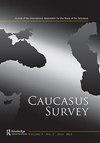边界化剧场:2008-2018年南奥塞梯边界线上的地缘政治企业家精神
IF 0.5
Q3 AREA STUDIES
引用次数: 13
摘要
边界化是指为了把一个领土的停火线变成一个国际边界而建造物理障碍。这个词最初是由欧盟官员用来指格鲁吉亚和事实上的南奥塞梯之间的行政分界线。本文分析该地区的实体边界建设如何成为象征性(地缘)政治游戏的剧场、格鲁吉亚国内政党之间政治竞争的背景道具,以及向国际观众展现格鲁吉亚受害者形象的朝圣地。把边界化作为国内不稳定或地缘政治侵略的证据,是一种可能起作用也可能不起作用的修辞策略。在格鲁吉亚国内政治中与之关系最密切的人失去了权力。然而,在国际上,边界化现在是俄罗斯地缘政治侵略的标准组成部分,就连支持边境墙的政客也提到了这一点。格鲁吉亚边界化戏剧的相对成功使霸权社会化的论点复杂化,因为它揭示了小国社会化霸权国家的能力,使其分享其受害者和脆弱性的比喻。本文章由计算机程序翻译,如有差异,请以英文原文为准。
Borderization theatre: geopolitical entrepreneurship on the South Ossetia boundary line, 2008–2018
ABSTRACT Borderization refers to the construction of physical barriers to transform a territorial ceasefire line into an international border. The term was used first by European Union officials to refer to the administrative boundary line between Georgia and de facto state of South Ossetia. The article analyses how physical border construction in this area became a theatre of symbolic (geo)political gamesmanship, a background prop for political competition between Georgian domestic parties and a pilgrimage site for visualizing Georgia’s victimhood to international audiences. Presenting borderization as evidence of domestic irresoluteness or geopolitical aggression is a rhetorical gambit that may or may not work. Those most associated with it in Georgian domestic politics lost power. Internationally, though, borderization is now part of standard litanies of Russian geopolitical aggression, cited even by politicians who support border walls. The relative success of Georgia’s borderization theatre complexifies hegemonic socialization arguments for it reveals the capacity of small states to socialize hegemonic states into sharing their tropes of victimhood and vulnerability.
求助全文
通过发布文献求助,成功后即可免费获取论文全文。
去求助
来源期刊

Caucasus Survey
Arts and Humanities-History
CiteScore
1.30
自引率
9.10%
发文量
4
期刊介绍:
Caucasus Survey is a new peer-reviewed, multidisciplinary and independent journal, concerned with the study of the Caucasus – the independent republics of Armenia, Azerbaijan and Georgia, de facto entities in the area and the North Caucasian republics and regions of the Russian Federation. Also covered are issues relating to the Republic of Kalmykia, Crimea, the Cossacks, Nogays, and Caucasian diasporas. Caucasus Survey aims to advance an area studies tradition in the humanities and social sciences about and from the Caucasus, connecting this tradition with core disciplinary concerns in the fields of history, political science, sociology, anthropology, cultural and religious studies, economics, political geography and demography, security, war and peace studies, and social psychology. Research enhancing understanding of the region’s conflicts and relations between the Russian Federation and the Caucasus, internationally and domestically with regard to the North Caucasus, features high in our concerns.
 求助内容:
求助内容: 应助结果提醒方式:
应助结果提醒方式:


